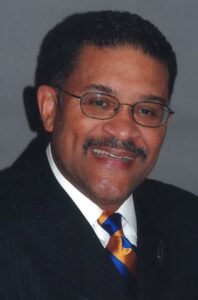
With more than four decades of professional experience, this historian employs a teaching style that enhances students’ classroom performance and enriches their daily lives.
Larry E. Rivers, a distinguished professor of history at Florida A&M University, was motivated to pursue a career as a college professor to benefit society. He was born in a small town outside West Philadelphia called Sharon Hill, Pennsylvania. He is married to Betty G. Rivers and has two sons, Larry and Linje Rivers.
Rivers received his bachelor’s degree in social sciences from Fort Valley State University in 1969. After graduating from FVSU, he pursued a master’s degree at Villanova University.
At 25, Rivers earned his first doctorate from Carnegie Mellon University in Pittsburgh and his second doctorate in cultural studies from the University of London 15 years later. He has authored and co-authored more than nine books and published over 30 refereed journal articles.
In 1977, he began his career at Florida A&M University, serving as a professor and later as dean of the College of Arts and Sciences. After nearly 30 years at FAMU, he left to assume the role of president at FVSU from 2006 to 2013.
Rivers couldn’t stay away from FAMU for long, though. In 2018, he decided to return as a distinguished university professor.
His motivation for being a professor comes from his belief that education can shape behavior. One of the most significant aspects of his role as a professor is providing students with the opportunity to think critically.
“A lot of the facts that I am teaching students they will forget, but if they develop a process of problem-solving, thinking on their own, they can apply those concepts and strategies to everyday life,” Rivers said.
Shirlyne Everette, 61, a retiree from the state of Florida, reflected on her time as a student in Rivers’ class.
“I liked him as a professor; he was very professional and seemed to have really cared about the students,” Everette said. “If we had any questions, he would always have hours available to help assist us,” she added.
Rivers wants to continue teaching so that young people can find their own niche and carry on his teachings and that of other instructors.
“Before I retire, I want to look back and know that I was instrumental in teaching students who have gone on to get medical degrees, Ph.D. degrees and that somehow, I was responsible in a small way for their educational development,” Rivers said.
Reginald Ellis, associate professor of history at Florida A&M University, has known Rivers his entire life and has modeled his career after him in many ways.
“Since my earlier recollection, I have always had a desire to be a Black college president, and that’s because I watched him and understood the concept from his witness of the importance of being a researcher and an advocate of everything HBCU,” Ellis said.